MEDIA RELEASE
For Immediate Release:
February 14, 2011
LONDON, Ontario –Today, London Health Sciences Centre (LHSC) announced a Canadian first for a surgical treatment for throat cancer.
On December 3, 2010 Dr. Anthony Nichols and Dr. Kevin Fung, head and neck surgeons, performed the first robotically assisted and minimally invasive laryngectomy or the removal of a small portion of the voicebox. This surgery was required to remove a cancerous lesion from the patient’s larynx. “The use of the robot essentially reduces the complexity of this surgery because it gives us a better view of the patient’s throat and larynx,” says Dr. Anthony Nichols, head and neck surgeon.
To perform the surgery, a surgeon navigates the surgical robot through the patient’s mouth and throat to reach the cancerous lesion in the larynx. The robotically assisted surgery also reduced the patient’s recovery with less pain medication. “This minimally invasive surgery spared the patient from excess scaring on the throat and neck. The surgery also eliminated the need for the patient to undergo chemotherapy or radiation treatment,” says Dr. Kevin Fung, head and neck surgeon.
Patient Gildard ‘Gil’ Légère, 72, from Sarnia, Ontario, recuperated from his surgery and is doing well. “I feel great,” says Légère.
This is the latest Canadian first surgery performed using LHSC’s DaVinci robot. Surgical robots have been used in London since 1999 when LHSC acquired its first surgical robot. In 2000, LHSC established CSTAR, Canadian Surgical Technologies & Advanced Robotics, as a research and education program in partnership with Lawson Health Research Institute and The University of Western Ontario to advance minimally invasive robotic surgeries.
“This surgery continues LHSC’s strong tradition of health care innovation and high quality patient care,” said Bonnie Adamson, President and CEO, LHSC as she congratulated the surgical team.
About London Health Sciences Centre
London Health Sciences Centre has been in the forefront of medicine in Canada for 135 years and offers the broadest range of specialized clinical services in Ontario. Building on the traditions of its founding hospitals to provide compassionate care in an academic teaching setting, London Health Sciences Centre is home to Children’s Hospital, South Street Hospital, University Hospital, Victoria Hospital, two family medical centres, and two research institutes – Children’s Health Research Institute and Lawson Health Research Institute, a joint research initiative with St. Joseph’s Health Care, London. As a leader in medical discovery and health research, London Health Sciences Centre has a history of over 50 international and national firsts and attracts top clinicians and researchers from around the world. As a regional referral centre, London Health Sciences Centre cares for the most medically complex patients including critically injured adults and children in Southwestern Ontario and beyond. The hospital’s nearly 15,000 staff, physicians, students and volunteers provide care for more than one million patient visits a year. For more information visit www.lhsc.on.ca
- 30 -
For media inquiries contact:
Stephan Beckhoff
Corporate Communications and Public Relations
London Health Sciences Centre
519-685-8500, ext. 74772
stephan.beckhoff@lhsc.on.ca
After-hours assistance:
Call LHSC Switchboard at 519-685-8500 and ask to page the communication consultant on-call
Backgrounder
Robotically Assisted Breakthroughs at LHSC
On December 3, 2010 Dr. Anthony Nichols and Dr. Kevin Fung, head and neck surgeons, performed the first robotically assisted and minimally invasive laryngectomy or the removal of a small portion of the voicebox.
This surgery is just the latest in LHSC’s long history of medical breakthroughs. Since 2000, LHSC’s has contributed the following robotically assisted innovations to health care:
2009
LHSC and Lawson Health Research Institute (Lawson) announce a Canadian first in the treatment of lung cancer, removing a small wedge from the patient’s lung and then applying a surgical mesh interwoven with brachytherapy seeds to where the lung was resected.
2008
LHSC performs the world’s first robotically-assisted intestinal bypass surgery for a patient with superior mesenteric artery (SMA) syndrome, also known as Wilkie’s syndrome, using the da Vinci® robot.
2007
Canada’s first robotic-assisted common bile duct exploration using a da Vinci robot is performed at LHSC.
2005
World’s first robotic-assisted left atrial appendage ligation to reduce the chance of clot formation and stroke in high risk patients with atrial fibrillation is performed at LHSC.
Canada’s first minimally invasive robotic-assisted double bypass surgery is performed at LHSC.
Canada’s first robotic-assisted multi vessel small thorocotomy is performed at LHSC.
2004
In a Canadian first in research for CSTAR (Canadian Surgical Technologies & Advanced Robotics), the four-armed da Vinci robot was used throughout a surgery to complete a radical prostatectomy.
A CSTAR team is the first in North America to complete two different procedures to clear blocked arteries, minimally invasive robotic-assisted heart bypass surgery and angioplasty with stenting, at the same time in the operating room.
In a North American first, an interdisciplinary team successfully removes a renal artery aneurysm with the help of a da Vinci surgical robot.
2003
LHSC surgeons are the first in Canada to use a four-armed da Vinci robot to complete a single coronary artery bypass graft.
LHSC’s Pulmonary surgery performed Canada’s first robotic-assisted lobectomy for lung cancer using Computer Motion’s AESOP® robotic arm.
2001
LHSC’s Pulmonary surgery team performed the world’s first robotic-assisted lung volume reduction using Computer Motion’s AESOP® robotic arm.
LHSC’s Pulmonary surgery team performed Canada’s first robotic-assisted resection of a lung cancer using Computer Motion’s AESOP® robotic arm.
LHSC’s Pulmonary surgery team performed Canada’s first robotic-assisted apical bullectomy for a pneumothorax using Computer Motion’s AESOP® robotic arm.
Using Socrates robotic technology, LHSC conducts the world's first robotic-assisted surgery via telementoring, in which one surgeon assisted and mentored another at a remote site and both manipulated robotic arms inside the patient in the operating room.
2000
LHSC's surgical team performs the first minimally invasive robotic-assisted mitral valve heart surgery in Canada.
LHSC counts its medical breakthroughs as among its proudest achievements. For a complete listing, please visit the LHSC medical breakthroughs website.



